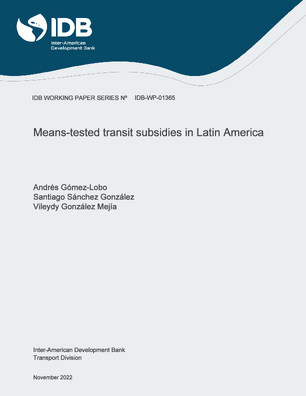Means-tested transit subsidies in Latin America
Date
Oct 2022
This paper reviews three targeted transit subsidies applied in Latin America. The Vale Transporte scheme in Brazil is the oldest, having been introduced in 1985. Household survey data for 26 metropolitan areas were used to estimate the distributional impact of the Vale Transporte. The results indicate that this program is badly targeted to low-income individuals. In 19 of the 26 cities, this subsidy is regressive. The reason is that only formal sector workers are eligible for this benefit while many low-income individuals work in the informal sector in Brazil. In addition, since this subsidy is paid by employers it is reasonable to expect compensating equilibrium effects in wages or unemployment. We present evidence that suggests that this may have occurred with wages. In contrast, Bogota and Buenos Aires have implemented demand side means-tested subsidies during the last decade. In these cases, criteria from the general welfare system are used to determine eligibility and both have been implemented using smartcard payment technology. We review the available information on the design, operation, and distributional outcomes for each case. This review provides useful information for policymakers interested in the design and implementation of targeted transit subsidies.




